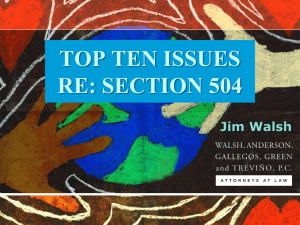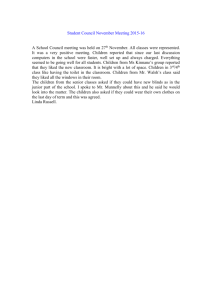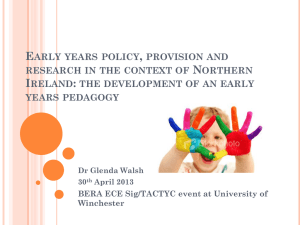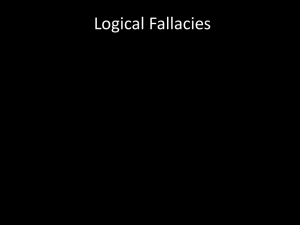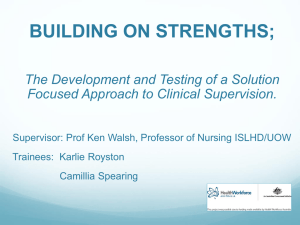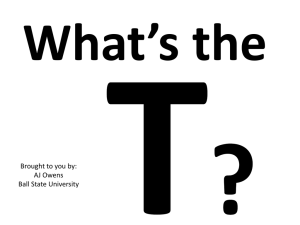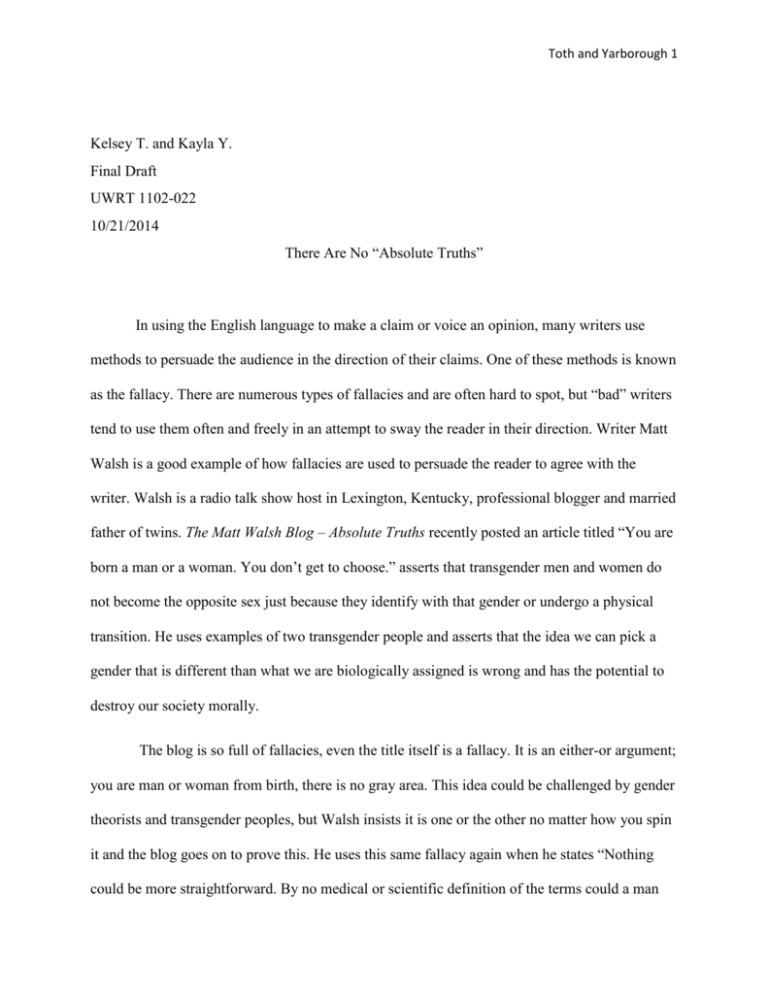
Toth and Yarborough 1
Kelsey T. and Kayla Y.
Final Draft
UWRT 1102-022
10/21/2014
There Are No “Absolute Truths”
In using the English language to make a claim or voice an opinion, many writers use
methods to persuade the audience in the direction of their claims. One of these methods is known
as the fallacy. There are numerous types of fallacies and are often hard to spot, but “bad” writers
tend to use them often and freely in an attempt to sway the reader in their direction. Writer Matt
Walsh is a good example of how fallacies are used to persuade the reader to agree with the
writer. Walsh is a radio talk show host in Lexington, Kentucky, professional blogger and married
father of twins. The Matt Walsh Blog – Absolute Truths recently posted an article titled “You are
born a man or a woman. You don’t get to choose.” asserts that transgender men and women do
not become the opposite sex just because they identify with that gender or undergo a physical
transition. He uses examples of two transgender people and asserts that the idea we can pick a
gender that is different than what we are biologically assigned is wrong and has the potential to
destroy our society morally.
The blog is so full of fallacies, even the title itself is a fallacy. It is an either-or argument;
you are man or woman from birth, there is no gray area. This idea could be challenged by gender
theorists and transgender peoples, but Walsh insists it is one or the other no matter how you spin
it and the blog goes on to prove this. He uses this same fallacy again when he states “Nothing
could be more straightforward. By no medical or scientific definition of the terms could a man
Toth and Yarborough 2
ever breastfeed. If he is, then he isn’t a he” (par. 22). Walsh again is insisting that there are rigid
definitions of what make a man a man and a woman a woman. He gives no evidence of this or an
alternative viewpoint, he simply says it is either one or the other.
The second fallacy Walsh uses is sarcasm. Sarcasm is used to imply a fault with a person
or group’s character and believes; it indirectly attacks their values. One example is when Walsh
says “Well, our hero, Boyd Burton (alias ‘Fallon Fox’) went overseas and had his penis chopped
off, then came back and became a ‘transgender female’ MMA fighter. Don’t you see? It’s OK
for him to break a woman’s face because he likes to pretend he is one” (par. 6). Walsh obviously
does not feel it is “OK” for a transgender to fight other women because he implies they are not
real women. This is a fallacy because not everyone feels transgender people are not the gender
they identify with. According to the World Health Organization, sex is a biological, the physical
parts you are born with determine your sex, but gender is socially constructed and
psychologically how you identify yourself, as a man or woman.
Walsh continues his sarcasm by saying “It’s cool to pound your fists into a woman’s
cranium as long as you feel like a woman while you’re doing it. That’s just good science. Or
‘science,’ as the case may be” (par. 7). Again, he uses this fallacy to imply that those who feel
internally they are a woman are not; the use of sarcasm here invalidates the beliefs transgender
women have that, regardless of the biology and science behind the physical characteristics, they
actually are women and identify internally and by society’s standards as one. As the advocacy
group GLAAD states, “For transgender people, the sex they were assigned at birth and their own
internal gender identity do not match.” There is not necessarily a right or wrong, but Walsh’s use
of sarcasm indicated to the reader that this view is wrong. He uses this fallacy once more at the
end of the article when he states “I won’t research to find out if men can have babies, for the
Toth and Yarborough 3
same reason that I won’t research what sound a horsie makes or how many cookies I’ll have if
my mommy gives me two when I already had three” (par 24). Using sarcasm to compare
researching transgender lifestyles to being a child implies to the reader that the beliefs or lifestyle
of transgenders is not valid enough to be taken seriously. This use of sarcasm is a way to attack
the individuals who are transgender indirectly to invalidate their lifestyle, making the reader feel
that it is almost silly to believe they may be entitled to this life. An article from The Atlantic that
discusses transgenders vlogging (video blogging) their journeys says:
“The feelings that lead someone to gender transition are very real no matter how they
end up expressing it. But coming out as transgender often leads to conflicting ideas about
what it really means to be transgender. Within the medically dictated and standardized
storyline, the rest of us often miss the nuances of gender identity, the small moments of
realization, and the many years that transition often takes.”
To those going through a gender transition, the emotions are very real and the process intense,
but many people do not bother to dig deeper into their experience. Walsh saying that researching
gender identity is as pointless as counting cookies (because a man with a penis is always a man),
shows how his sarcasm is used to discount their credibility.
Another fallacy Walsh uses several times is slippery slope. Slippery slope is a scare
tactic, used to suggest that if we let one thing to happen, we will open a whole can of worms and
will being to slide down, as Nancy Wood says in her list of fallacies, “a slippery slope to
disaster.” We first see Walsh use slippery slope when he says “Sure, it should come as no
surprise to anyone that progressive ‘gender theory’ is a perverse, morally bankrupt, backwards,
maniacal force of destruction” (par. 8). By Walsh calling gender theory a maniacal force of
destruction, he is indicating that if we believe or follow these gender theories, we will be lead to
Toth and Yarborough 4
disaster. However, he gives no definition of gender theory and what that means or how it will
lead to disaster, only that we should not be surprised that this perverse belief will doom us.
Another example of his use of slippery slope is the following sentences:
“Yes, we should deal with ISIS and illegal immigration and the economy and politics and
all the rest of it, but sooner or later, sane, rational, clear thinking individuals have to wake
up and smell the radical psychosexual indoctrination. It isn’t blowing up building or
taking your job, but it’s eating away at the intellectual and moral fabric of our society.
It’s driving people insane and blinding us to the basic realities of human nature” (par.
10).
Walsh is saying that if we do not deal with these ideas, the ideas that transgenders are the gender
they identify with, that our society will fall apart intellectually and morally. Using ISIS and the
economy in the same sentence is the scare tactic of this slippery slope; that somehow these ideas
of gender can be categorized with the threat of a terrorist group.
Further down the page, he uses a similar slippery slope again, by saying “We have to
understand that no existential threat matters if our civilization collapses in on itself before one of
those distant boogeymen gets the pleasure of annihilating it” (par. 11). Again, Walsh is
indicating that if we do not fix this problem, these progressive ideas of gender, it is going to be a
bigger threat to our society than any terrorist. He tells the reader that civilization will literally
collapse on itself because of this. The scare tactics in the slippery slope fallacy can be seen very
clear in this article. Using words such as “threat” and “annihilating” creates a sense of fear that
causes the reader to believe this is a bigger concern than it may actually be. Since Walsh
provides very little outside resources or facts to support these claims, the slippery slope fallacy is
Toth and Yarborough 5
very effective in getting the reader to believe transgender men and women are truly a threat and
we that we should not accept their lifestyle.
As you can see, Matt Walsh uses fallacies to state what he believe is “the obvious.” He
tries to convince the reader that what he says is the obvious truth, when in reality there are two
sides to the gender identity debate. His use of language within these fallacies creates a false
sense of authority, belittles the subjects and creates fear for the audience about gender identity
debates. At the end of the article, Walsh paraphrases Orwell saying “in a time of universal
confusion, stating the obvious is a revolutionary act” (p. 8). Isn’t it ironic that he references
Orwell, as if to say he would agree with his writing, and yet Walsh uses some of the qualities of
bad writing that Orwell himself warned against.
Toth and Yarborough 6
Works Cited
Deshane, Eve. "This Is My Voice: YouTube and the Transgender Autobiography." The Atlantic.
Atlantic Media Company, 14 Oct. 2014. Web. 20 Oct. 2014.
Dreger, Alice. "The Social Construction of Sex." Pacific Standard. N.p., 21 Mar. 2014. Web. 07
Oct. 2014.
"Transgender 101." @GLAAD. N.p., n.d. Web. 07 Oct. 2014.
Walsh, Matt. "You Are Born a Man or a Woman. You Don't Get to Choose.” The Matt Walsh
Blog. The Matt Walsh Blog, 24 Sept. 2014. Web. 01 Oct. 2014.
"What Do We Mean by "sex" and "gender"?" WHO. World Health Organization, n.d. Web. 07
Oct. 2014.
Wood, Nancy. Essentials of Argument. Upper Saddle River: Pearson / Prentice Hall, 2006.
Print.

